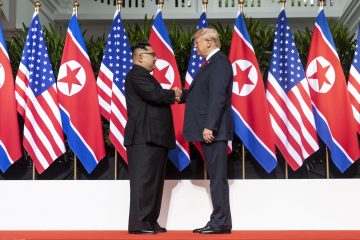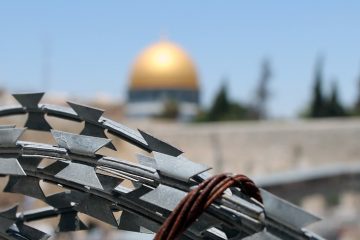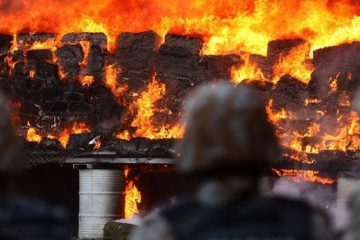Protests in an Age of Globalization: Performance, People Power, and Pathos
Protest in an age of globalization relies on performance. From Hong Kong to La Paz and Santiago to Khartoum, global attention is increasingly captured by mass movements of people, demonstrating strength in numbers against prevailing political and economic systems. Modern protests, however, only work some of the time. Drawing on current events, scholars might consider a protest’s success hinging upon which audience they choose to target and the power of that audience to act. We see differences, for example, between Hong Kong — where protesters engaged the global community with limited effect thus far on Beijing — and protests in Sudan earlier this year — which targeted an old, autocratic leader’s military cadre, but did in fact precipitate a military coup. Has globalization changed protesting? Today’s global stage is nothing new — consider the nationalist movements …
Russia’s constitutional reform and Putin’s plans for a legacy of stability
On 15 January, President Vladimir Putin called for a “greater balance between the branches of power” as he announced significant changes to the Russian constitution. On the same day, Prime Minister Dmitry Medvedev and his cabinet resigned and were quickly replaced. The new Prime Minister, Mikhail Mishustin, was a relatively unknown figure in Russia until recently, having previously spearheaded digital modernization efforts as head of the Federal Tax Service. The surprise changes are seen as preparation for the Putin’s departure from the presidency in 2024 given current constitutional restrictions, which prevent him from being president more than two consecutive terms. The proposed constitutional reforms would not facilitate his return to the post in the future, however, but instead propose to weaken the presidency …
Hong Kong: Have Protester Demographics Changed Following Escalating Violence?
As protests in Hong Kong have become more violent, have the demographics of the protesters changed? Political scientists have argued that a shift toward more violent protest action can alienate moderate protesters. Moderates, in this definition, are those who may share common cause with radicals (or those who embrace violent tactics) but reject those tactics. Once alienated, such moderate protesters tend to withdraw their support from a movement and may refrain from participating in protest action in the future. Hong Kong’s protests seem to have defied this trend. My surveys of protest participants find that the demographic profile of protesters has remained relatively constant even as violence has escalated in the demonstrations. Certain types of protesters who might be expected …
Belarus’s 2019 parliamentary election: consequential or not?
On 17 November 2019 Belarus chooses a new parliament. The last parliamentary elections, held in September 2016, brought two non-loyalist candidates into the lower chamber for the first time in more than a decade. Although the role of the parliament is relatively insignificant in the Belarusian political system, the outcome of the poll later this month will send an important signal about Belarus’s domestic trajectory. Moreover, the international response could determine the direction of travel for Belarus’s relations with Russia and Western states as it moves towards presidential elections in August 2020. 2016: A confidence trick? Elections in Belarus usually provide few surprises and critics fairly dismiss parliamentary ballots as inconsequential affairs. In the earlier part of his rule, President …

Three reasons why foreign policy negotiations during the 2020 campaign season are a bad idea
“Deals are my art form. Other people paint beautifully on canvas or write wonderful poetry. I like making deals, preferably big deals.” [Donald Trump, The Art of the Deal] If history is any guide, there is reason to hope that President Trump belatedly takes up painting this campaign season. Over the next 18 months or so, as always seems to be the case in American politics, the looming presence of a presidential election will throw up a whole host of impediments to the pursuit of optimal diplomatic agreements abroad, including with China, Afghanistan and North Korea. A brief look back at critical negotiations during the wars in Vietnam and Iraq suggests a crucial lesson: electoral politics and diplomacy do not mix …

Is Power Sharing a Solution to the Israeli-Palestinian Conflict?
The Israeli general election scheduled for 9th April is widely expected to be followed with the release of what has been termed the ‘Trump peace plan’ for the Israeli-Palestinian conflict. The release of the plan likely rests on the outcome of the election: if Benjamin Netanyahu’s Likud is not returned as the largest party with him as Prime Minister then the status of the plan is uncertain given that the Trump-Netanyahu relationship underpins it. However, who will win the election is far from certain, with the latest polling placing Likud in second place, but suggesting that the right-wing coalition headed by Netanyahu would retain a majority. Given the recent surprise announcement that the United States recognises the Israeli annexation of …

When are Green parties successful?
In 2018 Green parties are experiencing unprecedented levels of success in several advanced democracies; however, in a great many others they remain only minor footnotes to national electoral contests. Zack P. Grant argues that variation in Green party support is largely a function of good economic times, the presence of tangible environmental disputes, and mainstream parties actively attempting to emulate the positions of the Greens on their core issues (though the latter is dependent upon the age of Green parties themselves). Though it has attracted far less academic attention and media fuss than the ongoing ‘rise of the populist right’, several advanced democracies are currently undergoing a pronounced ‘Green surge’. After a somewhat disappointing 2017, in which they suffered parliamentary …

The War on Drugs’ Corroding Effect on Mexican Democracy
If it is part and parcel for democracies to (1) protect individual rights, (2) safeguard its citizenship from serious abuses of power, and (3) produce fair and reasonable laws which are impartially enforced, then we can assert that the misnamed “war on drugs” severely corrodes Mexican democracy. In general, the “war on drugs” is a punitive strategy which aims to increase drug prices and punish consumers, under the assumption that attacking supply can create a world without drugs. In Mexico, what is referred to as the “war on drugs” escalated in 2006, when then-president Felipe Calderón started “a frontal war against organized crime”, allegedly, to “keep drugs from reaching our children”. Calderón did so right after a highly competitive election …









